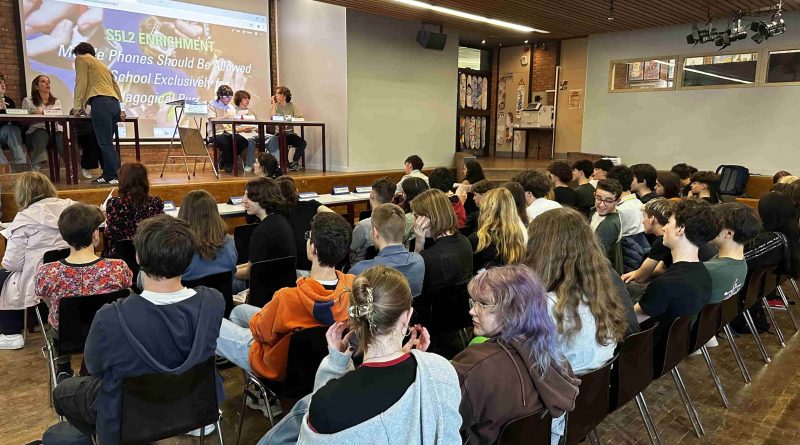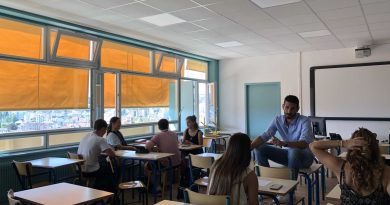A comprehensive review of the 2024 EEB1 enrichment debate
An overview of the event
The European School of Brussels 1 (EEB1)’s annual debate between the S5 English Enrichment classes took place a few weeks ago. Unfortunately, our class was watching from the sidelines, having lost to the two other teams. However, to not remain idle, we decided to use our experience both from having debated the other two teams and having watched (and presented) the debate to write an article. My classmate Josep and I also went out and interviewed Ms. Ayers’ class about what they took away from the debate, as well as what they would improve.
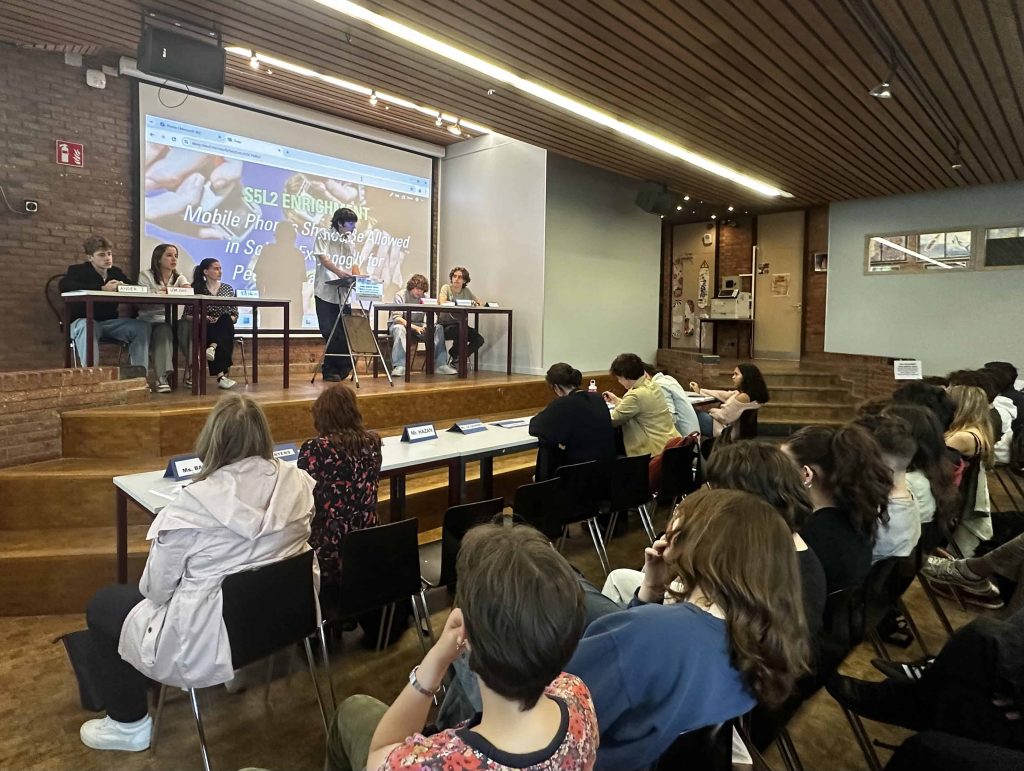
Timeline
The timeline of this year’s event looked as follows:
1.Lesson 1:
a.We found out a debate was taking place. We were briefly taught about the roles speakers had in the Cambridge Debate Format, as well as what our debate topic was (it was universal basic income, UBI for short).
b.We formed our class teams, which consisted of three debaters. These were chosen either from volunteers or by voting,
2.Lesson 2: We had one lesson, as well as time at home, to find out all about UBI,
3.Lessons 3 & 4:
a.We had two debates in a row in our regular classrooms, which were judged by our teachers and a third party,
b.The two teams that were to be debating in the finals were chosen from the two teams with the most wins, and were informed that the topic of the debate would be “Should mobile phones be allowed at school exceptionally for educational purposes?”
4.Lesson 5: The final debate took place in the Salle Polyvalente, our school’s “theatre hall”. Some members of the school’s direction would be present.
Although this is not exactly how it all happened, it is how it was supposed to happen. In the end the direction didn’t show up and two of the debates were moved because of some absences, but this did not have much of an effect on the outcome.
My thoughts
Overall, the debate went well, however as a spectator there were a couple of things that seemed less than perfect to me.
Flaws
First, the teams didn’t seem very sure of themselves, taking extra time to get their arguments in line and losing their line of argument during the debate. The topic meant the proposition had to argue both for reasons to ban phones, but also why they should not be banned for educational purposes. The opposition only had to argue for one of the following: we should ban phones, or phones should be allowed in all cases. Proving either point would win them the debate. Both teams seemed to get confused about what their argument at a given point was.

Second, the audience wasn’t aware of the topic of the debate before it happened, which led to the pauses between the speakers’ speeches to be filled with chatter about the topic, which is quite controversial these days (students are usually on one side of this controversy). Because of the disturbance pauses were, to be longer than expected, and the audience had to be quietened before the debate could resume.
Third, there wasn’t really a conclusion, which, added to the debate’s slightly chaotic character, resulted in a sense of the debate not leading to anything. The judges did not present the verdict they came to, nor did the pro- or opposition end in a way that would convince me they were right.
Virtues
There were also some things about the debate I enjoyed a lot. Since our school is so big, events (such as debates) are difficult to organize on a school level, or even on a year level. This debate, although it only involved enrichment students in the English L2 group, showed the value such events could bring to the school, giving a larger group of people the incentive to talk about a collective problem. As a debater myself, I learned a lot about the topic we debated about to qualify for the final debate, which was Universal Basic Income, and even though we did not go through in the end, it left me with a lot of valuable experience.
Interview
To see what one of the debating teams thought of their experience, my friend Josep and I went to Ms. Ayers’ class to interview them.
Hey, we are working on a news article for the EURSCMag about the debate; we would like to ask you a few questions about it. We will go into details later, but first we would like to ask you a broad question, what do you think about this year’s debate?
Ander (speaker of the proposition): I think it [the debate] was rushed, there was not enough preparation time, and the topic wasn’t interesting, so it was difficult to get into a mood to debate.
Lena (speaker of the proposition): I think there were not many people who signed up [for the debate] who were motivated, and it ended up just being people who said, “maybe I’d be fine with doing it”. There was a lack of participation. But in the end the result was positive.
Do you think the lack of participation was caused by the lack of motivation?
Ander and Lena: Yes.
Ander: I think the topic affected the will of people to debate.
Ms. Ayers: I feel like there was motivation in class, when we were preparing, but then once we saw the real topic it was [gone]. So maybe when thinking about the next year we need to make the topic a little more interesting.
Maria (audience): You couldn’t really go deep into this
What did you think of the wording of the topic? The topic itself was complicated, but it’s wording made it even more complex. As proposition you had argue for banning phones in all cases, except for educational purposes, and this made it complicated for you, right?
Ander: I definitely think so, the topic was extremely ambiguous, not so much for us (the proposition) but for the opposition, who had to decide whether to argue for a complete ban or no restrictions whatsoever. Only having two sides of the debate, instead of a position in the middle would have made it much easier to debate.
Moving away from the topic, what areas do you think you did best in? *silence, some laughter* Maybe which arguments are you the most satisfied with?
Ander: I think we did well filling up our time, we were afraid we’d run out of it, but we managed to fill up our time quite well. I think we found some decent arguments even though since this topic is so new, there haven’t been that many studies conducted. Even though we dug pretty deep to try and find information, it often was not there. But that once again comes back to the topic being difficult to work with.
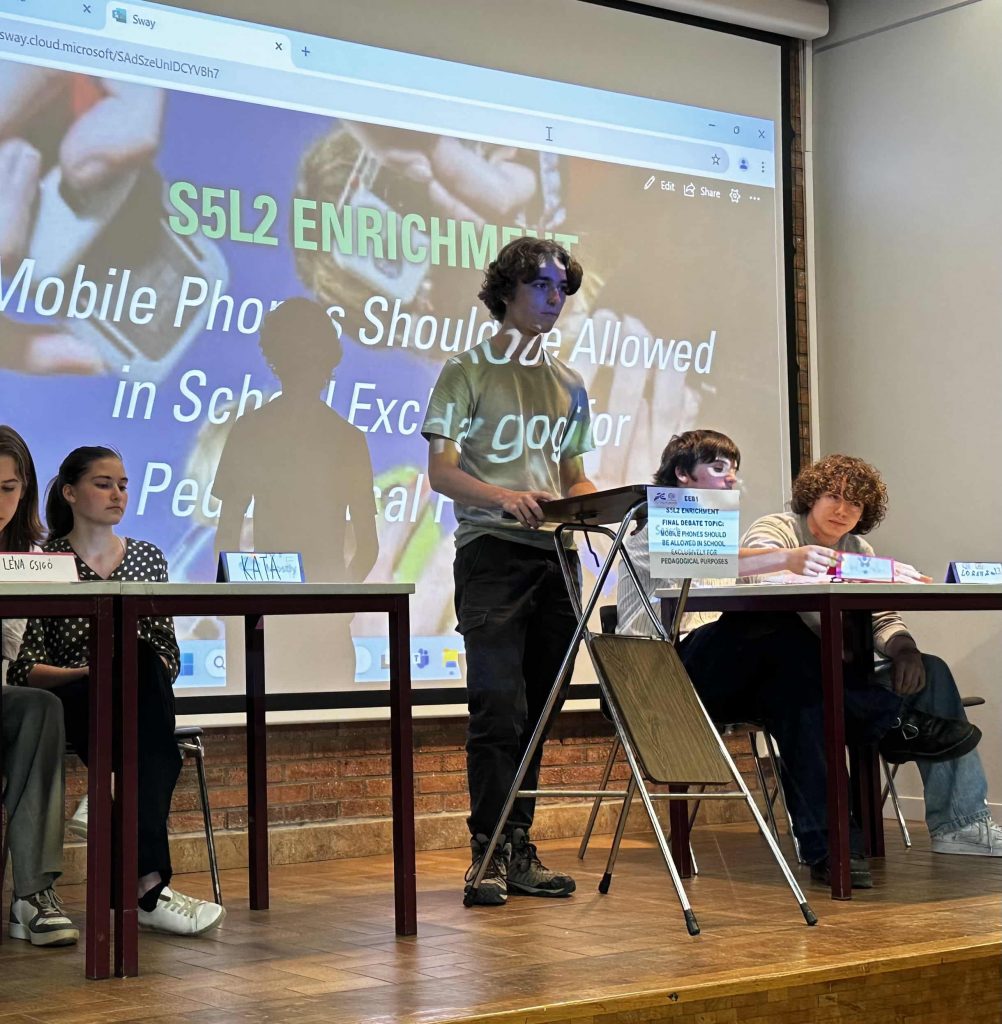
And what would make the debate easier for you? What do you think could be improved?
Lena: If we got more preparation time, we had one class where we were able to talk about the debate. Maybe if we had a few more it could make it easier. Also, if the question was not this ambiguous.
From what I could understand, some of the people who were supposed to be there debating couldn’t participate due to school trip or were sick.
Ander: Yes, I think this comes back to the lack of participation that there was in general. The fact that there weren’t many people who actually wanted to participate in the final debate made it hard to form a team to debate. I myself volunteered as backup thinking I won’t necessarily be needed, because I thought the other debaters we had practiced with previously plus the other people that were interested in participating in the final one would be enough to form a team but, in the end, even as backup I had to step up and become part of the team at the last minute.
Kata (speaker of the proposition): There was a question about our strengths or something?
Yes. I think our strengths were that we had a very structured argument, I think we had a good general conception of the topic, and those were our strong points. Now the second question was about improvements I would make to the debate. As a speaker I wasn’t sure whether the audience could hear me well, how the time was kept, which made me rush a little, and I might have not been very clear in my speech. Overall though I think it was nice and organized in a way that worked.
I debated your class in our first debate, and it was quite the stressful experience. I think I could have been better prepared in talking to a bigger audience than just my class. Did you feel this way with the even bigger audience in the Salle Polyvalente (SP)?
Ander: I think the debate in the class and the final one were very different. In class, you’re only debating in front of your class and teacher and maybe a second class and teacher, whereas in the final debate we were speaking in front of other teachers, whom we may not like. We were supposed to speak in front of Mr. Tran and Mr. Hazan, whose absence I feel was actually better for my performance. I was really nervous about debating in front of the Director and Mr. Hazan (whose job I don’t know, but he’s scary). I think we had issues with the audience in the other debates, they can be a nuisance to the speakers while they state their arguments.
Lena: For one it was a big crowd, but it was also a pleasant surprise, I saw a few of my friends and teachers who were supportive of me and sort of cheering me on.
Kata: I didn’t know the debate was going to be in the SP, but I think it might have helped me. I was dropped I the middle of the situation, and coping with everything as things went along. This helped me not overstress it, which is a tendency of mine.
Ander: We did not know the location of the debate; it came as a complete surprise. It was really well planned, we had a microphone to speak into, there were lights pointed towards us, we had prepared seats. However I disagree with Lena, I think it would have been better if the crowd were complete strangers I would care less about what they think of what I say.
And did you like the debate overall? If there were another one, would you participate?
Ander: Yeah, I would definitely consider doing it again, maybe not being in the final as a debater, but I would gladly help with preparing the arguments and sharing my experience.
Lena: I think I would participate next year if I could. Maybe if the topic isn’t very engaging again, I’ll change my mind, and just help with the arguments, but it was very interesting.
Kata: I think this was a big opportunity to gain experience in talking to people and argumenting in public. It was hard and sometimes stressful, but overall, it was mostly enriching.
And do you have any improvements to suggest to the organizers of next year’s debate?
Omar (audience): I think it would be helpful if the audience could ask the debaters questions at the end of the debate, it could help sum up what we heard and make the audience a little more engaged.
Ander: I agree with Omar, I think the debate is not very fun or engaging as part of the audience. Even though the debate is a big thing for the debaters, its intense, stressful and important to them, when you’re in the audience you don’t have much to do, as an enrichment student you might take part in researching the topic, but mostly people only sit there and listen to it till the end.
Jonah (audience): I agree with Omar, the questions would be a good idea, especially to hold the last speakers accountable. From what I heard* they might have lied a bit and there was no opportunity to correct them.
Kata: Another good idea would be having a specific conclusion in relation to our school if the topic is relevant to events here. I feel like even though there is a lot happening with phones all our arguments were thrown in the wind and ended up being useless.
Ms. Ayers: Aah yeah, like a solution when it has to do with specific events.
Ander: It felt a bit in vain.
Omar: I think to remove confusion and make it fair; the evaluation grid should be transparent and known to the debaters.
Ander: It would really help to know what we are getting evaluated on.
Summary
As you can see, there was a lot to talk about during the debate, both good and bad, as well as some observations. I think you could summarize this interview in a couple of points:
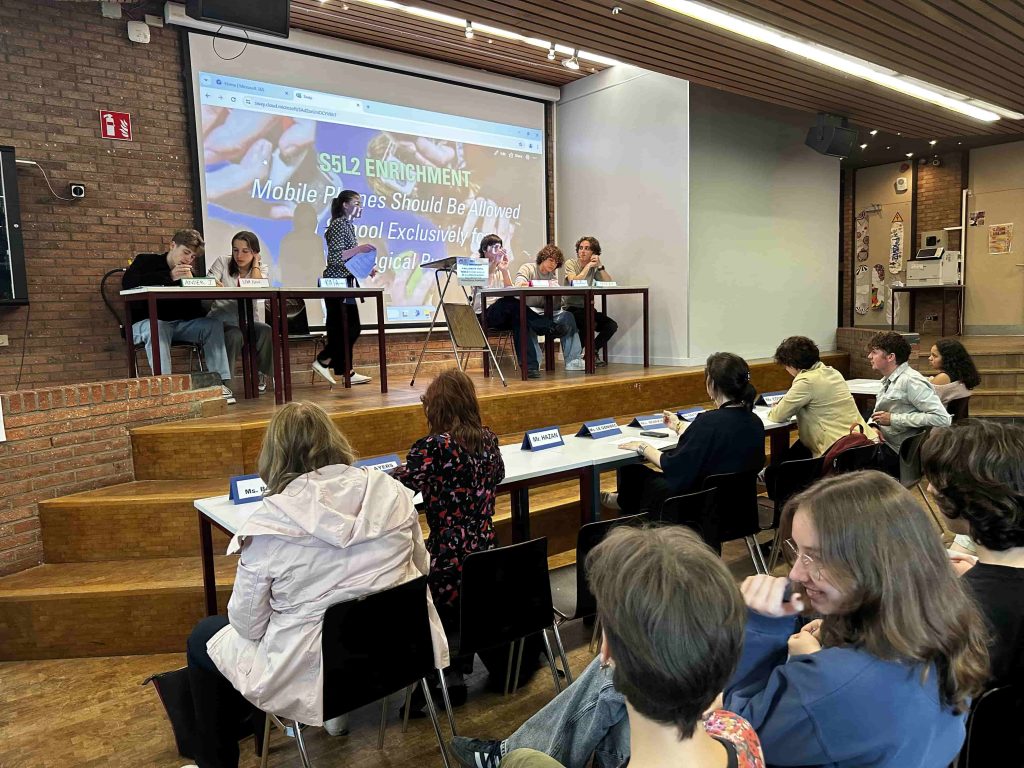
- The debate was a great idea, all debaters appreciated it
- It’s an experience you don’t usually have in your English class
- It was well thought out, with the stage being set up and everything
- There were some basics missing, like transparent evaluation criteria, time to prepare for the debate as a team and choosing a good topic.
- It isn’t very audience-friendly
- It would be difficult to do with a bigger class.
Three of these points are positive, and what can be taken away from them is that the debate should be kept in this format and organized next year with some improvements, which can easily be implemented seeing how well the final was set up.
It’s a huge opportunity, but could be better
The debate is something not everyone can participate in, but it is worthwhile to both the debater and the spectator to witness one at school, to see how it works and have some experience with it once they inevitably come across one in the real world. A debate is a very good way to discuss controversial topics in public, and we, as students, should be acquainted with them in a way that teaches us about them. However, to have a truly positive experience for everyone the observations from this year need to result in some changes next year.
First, the final debate was confusing for everyone, the topic being ambiguous and the location of the debate remaining a mystery to most until the last moment. This could be solved by letting the debate teams prepare for a longer time and giving them their evaluation criteria, as well as having a mic-check before the debate. The topic should be chosen to be something the debaters can take different stances on and not be a middle of the road thing. This year’s topic had the opposition fending off arguments from two sides, and the debaters all had already had a clear stance on it for a long time. When debating, they should be able to set aside their personal convictions, but to me it seemed like a bad attempt to make the students say what the school has been saying without any effect. It was also a topic there was not much factual evidence to use, which allowed for a lot of unfounded arguments.
And second, the audience’s experience should be better taken care of, this year they did not even know they were attending the debate before their teachers left a note on their classroom doors that they are to go to the Salle Polyvalente instead of their usual class. The teachers who want their classes to attend should announce it to their students at least during the preceding class, and they should explain the Cambridge format and tell the students what the topic is. After the debate the audience should be allowed to ask questions, this will incentivize them to pay better attention during the debate and take an overall interest in it.
The absence of these things was not a deal breaker as you can hear form the finalists themselves. Nevertheless, these adjustments would be very welcome, and it’s a good thing they will be very simple to implement. I personally enjoyed the debate a lot, as well as the preparation for it, and I look forward to an improved one being organized next year.
Maciek Kuik and Josep Tedo Font / S5 / EEB1 Uccle

